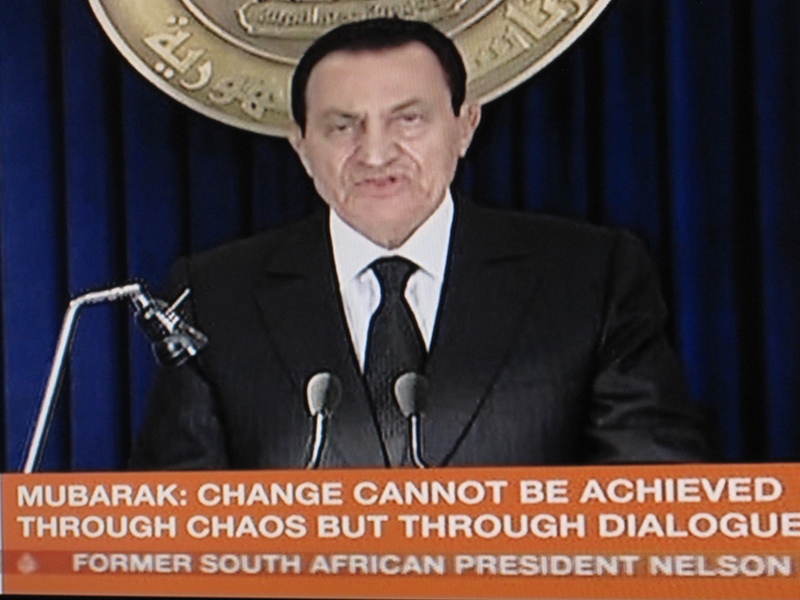This is the headline on a great column by Nicholas Kristof in the NYT. What was obvious from the beginning was that the Egyptian popular uprising posed terrible problems for the US, which has spent 30 years cosying up to Mubarak and his thugs (who, among other things, have been very obliging in providing torture services in circumstances where the CIA has been too squeamish). It seems only yesterday that Hilary Clinton was describing the Mubarak regime as “stable”. Kristof points out that not only are the Obama crowd way behind the Egyptian curve, but by making a big deal of their success in persuading the old brute not to run for election they have actually made a bad situation worse for US interests in the longer run. It’s astonishing to watch a powerful and supposedly intelligent Administration make such idiotic decisions. First their response to WikiLeaks. Now this. But let’s hear Kristof on the matter:
I’m afraid that too many Egyptian and American officials have been spending their time talking to each other, and not enough time talking to grassroots Egyptians in Tahrir Square and elsewhere. Everybody I’ve interviewed in Tahrir has said that as a starting point, Mubarak has to resign. Now! People aren’t going to be placated by him saying that he won’t run again – especially since it was never clear that he planned to do so anyway.
Fundamentally, what Egyptians want is not just a change in the individual at the top – although they want that – but also a change in the system. They want a democracy. They want a voice. They want an end to corruption. And now that they’ve found their voices, I don’t think they’re going to be easily silenced.
I’m also struck that the anger at Mubarak is growing. At first, the demands were simply that he leave office. But today on Tahrir, I heard people say and saw signs saying that he should be exiled, put on trial, or even executed. One dramatic sign showed Mubarak in a hangman’s noose.
The point is that there is zero confidence in Mubarak. So the idea that Egyptians would trust him to rule for months more, and possibly engineer a succession to a Mubarak clone, is preposterous.
I also fear that this choreography – sending former diplomat Frank Wisner (whom I admire) to get Mubarak to say he won’t run for reelection — will further harm America’s image. This will come across in Egypt as collusion between Obama and Mubarak to distract the public with a half step; it will be interpreted as dissing the democracy movement once again. This will feed the narrative that it’s the United States that calls the shots in the Mubarak regime, and that it’s the United States that is trying to outmaneuver the democracy movement. In effect, we have confirmed to a suspicious Egyptian public that we are in bed with Mubarak and trying to perpetuate his regime (even without him at the top) in defiance of a popular democratic movement.
Great stuff.
LATER: This interesting piece by Craig Scott in openDemocracy:
On the Egypt front, Luke Johnson in the American Independent reminded us of Secretary of State Clinton’s interview with Al Arabiya TV in Egypt in March 2009.2 Clinton engaged in downplaying to the point of virtual dismissal the relevance of the annual Department of State’s country report on the human rights situation in Egypt. That 2008 report (published in early 2009) discusses in considerable detail the extensive and systemic use of torture by the police and security services in Egypt. That apparatus has been instrumental to sustaining Mubarak in power for the past 30 years (not to mention to the US’ outsourcing of torture-for-intelligence). In response to a journalist’s question, Clinton commented, “We issue these reports on every country. We consider Egypt to be a friend and we engage in very forthright conversations with our friends. And so we hope that it will be taken in the spirit in which it is offered, that we all have room for improvement.”



